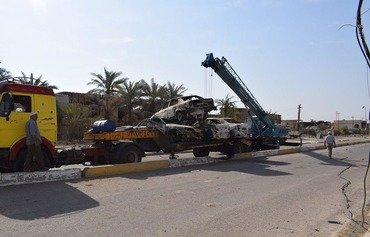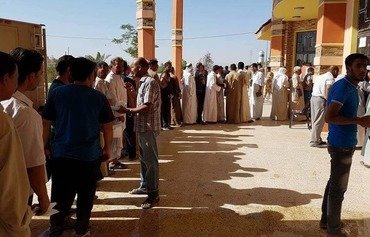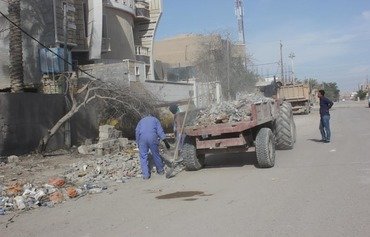As soon as the liberation of Fallujah from the "Islamic State of Iraq and the Levant" (ISIL) was announced, the Iraqi government launched an ambitious campaign to rehabilitate the city and rebuild its damaged infrastructure.
This work will pave the way for the rapid return of the city's displaced residents, more than 85,000 of whom fled the Fallujah area since the battle to liberate the city began on May 23rd, according to a UN World Food Programme survey.
“Based on central directives from Prime Minister Haider al-Abadi, a subcommittee for Anbar province has been formed to work towards expediting the return of displaced families to their homes in Fallujah,” Anbar governor Suhaib al-Rawi told Diyaruna.
The commission is headed by Fallujah's mayor, he said, and includes representatives from Anbar Operations Command, provincial police command, the National Security Services in Fallujah, Defence Intelligence and the Investigation Unit of the Ministry of Interior.
“The commission will work towards accelerating security checks as well as co-ordinating with a committee tasked with restoring stability to Fallujah in preparation for the return of displaced families to their homes as soon as possible,” al-Rawi said.
The governor said he visited Fallujah on July 16th to inspect the progress of operations, and confirmed that the reconstruction equipment had arrived.
Restoring services
“The most important challenge in Fallujah is restoring drinking water facilities to a functioning state, particularly the central water plant in al-Azrakiyah, which feeds most parts of the city and is heavily damaged," said Fallujah govenor Saadoun al-Shaalan. "This facility has to be up and running before displaced people can come back home”.
All other matters are relatively easy in comparison with the water issue, he told Diyaruna, adding that the authorities are working to reopen roads and remove debris.
As for electricity, al-Shaalan said, the local authority can make up for shortages for the time being by using generators, in addition to operating the undamaged energy plants, such as the one near the Fallujah cement plant, until the rest of the electricity generating plants are back in working order.
“The city of Fallujah will be completely functioning to receive returnees by this September, as roads and the metal bridge all will be reopened,” he said.
“Operations to restore stability to the city will be easier than in Ramadi because ISIL, it seems, was unable to rig houses and government facilities with explosives, and the explosive devices it did leave behind are negligible," he said.
Return of local police
A number of security and administrative offices also have been reopened in the city, according to Anbar police chief Maj. Gen. Hadi Erzaij.
The Fallujah police station, the civil defence unit as well as the offices of the local council, traffic control and the city's security services were reopened based on directives from the Ministry of Interior, he said.
“The security apparatus in the city has started to check into the security background of returnees and has been conducting early checks into their personal data,” Erzaij told Diyaruna.
For now, security responsibilities are still in the hands of the joint army and police forces, he said, but they are are slated to be handed over to the local police force and the tribal council in the area soon.

![Iraqi security forces clean a street in Anbar province. [Photo courtesy of Anbar Police Directorate]](/cnmi_di/images/2016/07/25/5901-Iraq-anbar-security-600_384.jpg)






